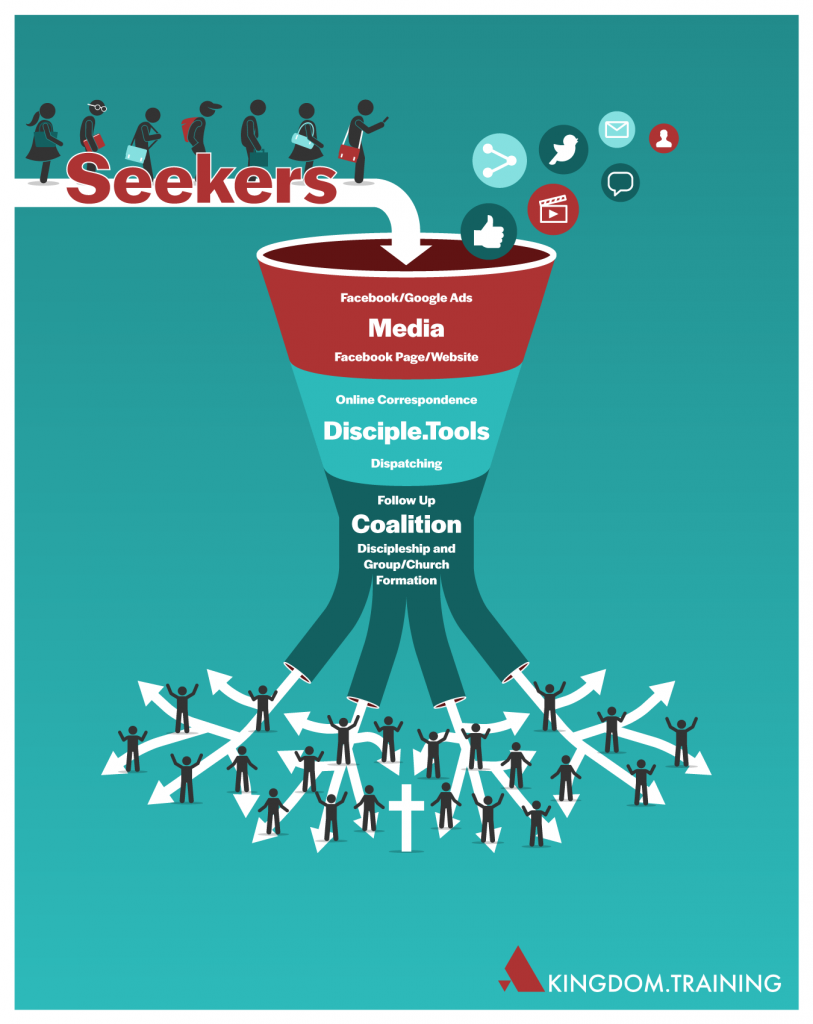
What is a Dispatcher?

A Dispatcher in a Media to Disciple Making Movements (M2DMM) initiative connects seekers from the online conversation with a Digital Filterer to a face-to-face relationship with a Multiplier.
In a Disciple.Tools system, a Dispatcher is the default role who will be initially assigned to all new media contacts who need to be dispatched to the coalition of Multipliers. They also maintain the integrity of the system keeping it organized and information flowing between all roles.
What are the Dispatcher’s responsibilities?
Dispatch and Assign New Contacts
A Dispatcher will look at characteristics of the contact such as gender, language, and geographical location and match this person with the most appropriate Multiplier.
Multipliers have varied limits for capacity as well as travel and time availability. Also, Multipliers who are shown to be faithful with their contacts also are entrusted with more.
One of the most vulnerable and delicate points of the M2DMM system happens during the handoff from online to offline. The Dispatcher tries to ensure the relationship between the contact and the Digital Filterer smoothly transitions to a relationship with the Multiplier. The more clear the expectations are spelled out for every role in the M2DMM system, the better this will go.
When there are contacts in an area with no Multipliers, the Dispatcher will need to work with the other roles to decide what happens in these cases. There is not always a right answer to these situations. Therefore, the dispatcher might have to make tough calls to achieve the best outcome even when there is no good or great option.
Monitor Supply and Demand
Since Dispatchers have access to all contacts and work with the Coalition of Multipliers, they will have the greatest sense of what is happening in the field. They will work to find the balance between the demand of seekers and supply of Multipliers across geography and seasons.
They know which Multipliers are available and where they are willing to travel. They know which cities are getting the most responses from ad campaigns and which cities need more workers to match the ripening fruit.
Maintain Healthy System
Dispatchers will usually see first when something is broken in the system or where there are bottlenecks. They may not be able to fix the problem themselves, but they will need to communicate it.
Sometimes Multipliers will be overwhelmed and burnt out and other times they will be discontent that there are not enough new contacts. The Dispatcher tends to identify these trends first.
The Dispatcher will need to stay in sync with and be a key communicator between the Multipliers and Digital Filterers. Since they are the glue moving seekers from online to offline, it is important they are eliciting feedback from and communicating it to both ends.
With all of their interpersonal knowledge, Dispatchers will have the best insights into who needs different levels of training and how to enhance group collaboration.
Dispatchers are given more tools in Disciple.Tools because they are tasked with keeping the records and system clean. If there are duplicate contacts, the Dispatcher will need to merge these. This will prevent two different Multipliers from trying to call the same contact. Dispatchers will need to set up filters to ensure contacts are being contacted, met with, and their records are updated.
Foster Accountability
Dispatchers will be the first to gauge when Multipliers are falling behind or not following through with their partnership agreements. If seekers are not being contacted or followed up with, the Dispatcher would be the one to bring awareness to the issue.
In Disciple.Tools, the Dispatcher can request updates on Contact Records for Multipliers to report on the health and journey of the contact. This is not meant to be legalistic but to care for every seeker so no one falls through the cracks.
How does the Dispatcher work with other roles?
Coalition Developer: The Dispatcher could also be the Coalition Developer. If the role grows too big, these can be separated. If there is a separate Coalition Developer, he/she will be representative of the Multipliers at large. The Dispatcher would help to keep communication open between this role and the digital response team.
Multipliers: The Dispatcher will need to maintain good communication and healthy relationships with the Multipliers. The Dispatcher passes the responsibility of each soul to the Multiplier and holds them accountable to their partnership agreement to steward the relationship with great care and intentionality.
Visionary Leader: The Dispatcher helps the Visionary Leader to see current realities. The Visionary Leader is often looking at what needs to be and does not always have a pulse on what is currently happening. Communicate this to the Visionary Leaders, helps the leader make better decisions.
Digital Filterer: The digital response team will need to develop their workflows and protocols for when a contact is ready to be dispatched to a Multiplier. It is important the Dispatcher understands these well. The Dispatcher will be maintaining open communication between Digital Filterers and the coalition of Multipliers.
Marketer: The Dispatcher will be a source of information for the Marketer to help them make creative and strategic decisions on future content. The Dispatcher will also need to inform the Marketer about the supply and demand ratio of contacts to Multipliers.
Learn more about the roles needed to launch a Media to DMM strategy.
Who will make a good Dispatcher?
Someone who:
- is trained in Disciple Making Movements strategy
- is dedicated
- is disciplined
- can balance care for the seeker as an individual soul and also understand the importance of workflows in a task-oriented structure
- has good listening and communication skills
- is security conscious. They use secure passwords and 2-factor authentication. It is recommended that Dispatchers only use Disciple.Tools on a laptop and not a cell phone since phones tend to be lost or stolen more often.
- can read and interact in the local language of the contacts
- maintains good boundaries. As the system grows, notifications for new contacts will increase. They do need to immediately dispatch new contacts, but they should have boundaries on immediate response to all issues. Dispatching new contacts should take priority over other tasks and is the main one to make sure you complete while having set some boundaries.
Advice for Dispatchers
- As the number of contacts grows, consider turning notifications off on your phone and dispatch at scheduled times, otherwise, your phone will be dinging many times an hour and at all hours.
- Start with one Dispatcher but quickly try to train another as a backup. However, this role is not easily transferable. It is not a role that is easily started and stopped. The Dispatcher collects a lot of data points that help them make decisions. These volumes of data cannot be relayed to someone else, so transitions in this role will highly affect the quality of dispatching decisions.
- Expect to be a diplomat and involved in the middle of tangled messes. You do not have to know the solution to every issue but will often be looked to for guidance.
- Clear communication with Multipliers is critical for a Dispatcher to effectively do his/her job. One example of a good practice is to ask, “Can you reach out to this contact in the next couple of days” vs. “Can you take a new contact?”. The first example more clearly communicates the expectation for the Multiplier to contact with timeliness/urgency.
What questions do you have about the Dispatcher role?


without this course, it would be harder to work in DT. Thanks